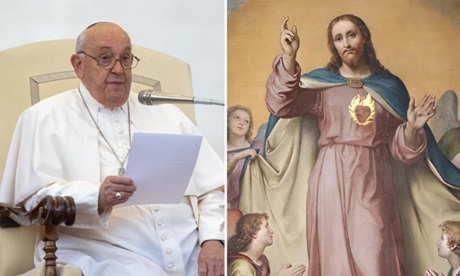On October 24, Pope Francis released his fourth encyclical, titled Dilexit nos (“He Loved Us”), dedicated to the Sacred Heart.
Unlike the widespread political and media interest surrounding Laudato si’ in 2015 or even Fratelli tutti in 2020, this encyclical received little attention beyond Catholic circles.
An encyclical’s impact takes time.
In 2015, Laudato si’ coincided with the COP21 summit in Paris, which amplified its reception. For Dilexit nos, however, there was no prior anticipation.
Unlike Fratelli tutti, which included accessible themes such as migration and human unity, this new encyclical on the Sacred Heart appears almost inscrutable to the French media landscape.
This lack of visibility reflects some level of media disinterest in church life, a point the church should consider.
To complicate matters, the encyclical was released just days before the conclusion of the Synod, diluting its impact.
Additionally, Dilexit nos may have unsettled some readers.
The pope’s last two encyclicals were highly social in focus, making Francis appear more of a political figure than a religious leader.
Public opinion is often more engaged with his social and political positions than the spiritual reflections underlying them.
Thus, Dilexit nos might surprise or even disappoint some. IYet, by meditating on human love, it addresses the most significant social bond, ending with the “heart of hearts”: the role of love.
It’s a profound message that aligns with his consistent teachings since the beginning of his papacy.
An encyclical for everyone
I don’t believe this encyclical is aimed solely at Catholics. For those who take the time to read it, Pope Francis offers solutions to address today’s crises.
For me, Dilexit nos completes a trilogy with Laudato si’ and Fratelli tutti.
First, he addressed the environment, our shared “body” marked by ecological suffering; then the social body, torn by war and division; now, he turns to the bodily self, emphasizing human interiority.
Without reconnecting with the inner power of love, humanity won’t find solutions to the struggles highlighted in the first two encyclicals.
Though the message—calling for the awakening of hearts—has yet to be widely received, I’m convinced this encyclical has a promising future.
The pope underscored that true change begins in the heart.
Love is an antidote to an increasingly cold, indifferent world. Therefore, we must embrace this text and convey what the pope seeks to communicate.
“There seems to be a waning interest in the pope”
Jean-Louis de La Vaissière, former AFP journalist accredited to the Vatican from 2011 to 2016 and author of several books on the papacy.
Media disinterest
It’s unsurprising that this encyclical received little media attention.
Over time, though still popular, Pope Francis attracts interest only when addressing hot-button issues like same-sex couple blessings or women’s ordination.
Topics like his health or potential resignation also draw attention, but little else does.
After eleven years of pontificate, there’s a noticeable erosion of interest.
This was evident after his trip to Marseille in September 2023, where his message, particularly on immigration, wasn’t universally well-received.
During his September trip to Asia, French news outlets barely covered it, overshadowed by domestic stories.
Similarly, his visit to Belgium was only noted for his comments on abortion, which sparked shock.
The French media and society are largely indifferent to deeply religious subjects like the Sacred Heart.
Francis’ previous encyclicals, Laudato si’ on the environment and Fratelli tutti on fraternity, resonated because they touched on issues relevant to the public.
Pope John Paul II’s powerful words attracted a lot of attention in previous decades, as did Benedict XVI’s, despite their theological depth.
With this encyclical on the Sacred Heart, Francis presents a deeply religious text tinged with traditional, popular devotion, which France’s major media tend to dismiss.
It reflects the paradox of a pope who embraces the modern world yet draws deeply from tradition. His call to return to the essentials—love, affection, connection—runs counter to today’s values: speed, efficiency, profitability.
Pope Francis is a cultured man, steeped in French theological tradition and European mysticism. Yet these references no longer resonate widely.
This disinterest may also reflect a deeper issue: some feel disillusioned with him because he hasn’t conformed to the progressive ideals many expected.
His message is paradoxical, at times daring, at others more conservative.
His recent strong statements against abortion in Belgium, for example, surprised the French, who largely support constitutionalising abortion rights.
Such views may have led the media to dismiss him as a relic of the past, not the progressive leader they anticipated.
- First published in La Croix
- Arnaud Bevilacqua and Clémence Houdaille are journalists at La Croix
News category: Analysis and Comment.




